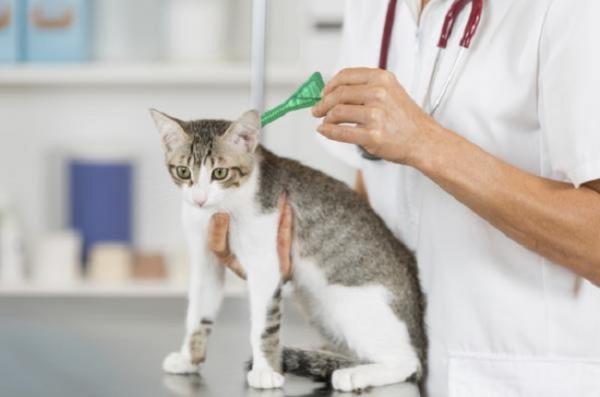Deworming in cats

Cats are very clean animals, pay close attention to their hygiene but that does not mean they are protected against parasites like fleas. If your cat goes outside or lives with other animals is susceptible to suffer them. These parasites, both internal and external, can affect our cat and cause serious diseases.
For this reason it is fundamental deworm on a regular basis to our pet. Keep reading and discover how you can protect your cat from parasites.
In this article you will discover the importance of properly deworm your cat. It is a key element in the health of our cat and with the right treatment we can forget about these problems.
External deworming
The fleas and ticks They are the main parasites that can affect your cat. If you regularly go outside, you are more exposed, but even if your cat does not leave the house, it is convenient to protect it. These parasites can be observed with the naked eye and the cat will scratch more than usual. It is important to clean the blankets or beds you use if you notice that you have fleas or ticks.
There are several ways to deworm externally in the market and each protects in different ways:
- Pipettes: It is administered in the back of the neck of the cat, where it can not be licked. It is not necessary to extend it, it protects the whole body after a few minutes. It serves as a treatment to eliminate possible existing parasites and as a prevention. Depending on the brand, the time between doses can vary and usually occurs in three or more measures depending on the cat’s weight. The last thing is the pipettes that deworm both externally and internally.
- Shampoos: They are used as a treatment, they eliminate an infestation but it is not useful as a prevention.
- Antiparasitic collars: It prevents fleas from adhering but does not protect for a long time. If your cat is not used to wearing a collar, it can be a problem.
- Pills: The tablets are used in special cases such as very small puppies or pregnant cats.
- Sprays: The sprays are sprayed on the entire body of the animal. Its effectiveness is between the 2-4 weeks and is usually used in small cats.
Choose the one that best suits your cat’s needs. There may be differences in the composition according to the brands but most protect effectively.

Internal deworming
Internal parasites affect the digestive system of cats, causing serious problems if you do not act. Flat worms such as tapeworms and round worms are often the most frequent in cats and can trigger severe deficiencies. In addition, a cat with internal parasites can infect others and itself through feces.
Un stool analysis will reveal the presence of such parasites.
The existing methods in the market do not prevent against these parasites, they only eliminate existing ones, that’s why we will administer them more regularly:
- Pills: It is the most used method, your veterinarian will indicate the most appropriate for your cat. You can mix it with food to make it easier to eat.
- Injections: In special cases, your veterinarian can administer the drugs via blood.
- Liquid: Orally, it is given with a syringe without a needle directly in the mouth.
- Pipettes: There are pipettes that deworm both internally and externally.

When do I start the treatment and how regularly?
External deworming:
We must protect our cat against external parasites from very young, talk to your veterinarian and choose the one that best suits your cat. You can use a spray in the first months of life and in adulthood use pipettes.
Depending on the chosen product, the protection time may vary. If your cat lives inside the house and does not usually go outside or interact with other cats you can apply a pipette every 3 months. If your cat goes out a lot and is related to others you can shorten the time between doses to 1,5 months.
Internal deworming:
The first shot will be at 6 weeks of life. If your cat is a puppy, your veterinarian will indicate the deworming and vaccination schedule. The animal must always be internally dewormed before each vaccination.
Your veterinarian will inform you of the recommended doses for your puppy. Remember that in the first 3-4 months of life is when your cat receives the most important vaccines. During the first 6 months it will be dewormed monthly, after every 3 months It’s enough.
If you have just adopted an adult cat you can perform both external and internal deworming at home. Although it is a healthy looking cat, we must make sure that we eliminate any parasites it may have. So not only protect other cats in the house but also humans since there are diseases such as feline toxoplasmosis that can affect man.

This article is merely informative, in .com we do not have the faculty to prescribe veterinary treatments or make any kind of diagnosis. We invite you to take your pet to the veterinarian in case of any type of condition or discomfort.
If you want to read more articles similar to Deworming in cats, we recommend that you enter in our Deworming section.


